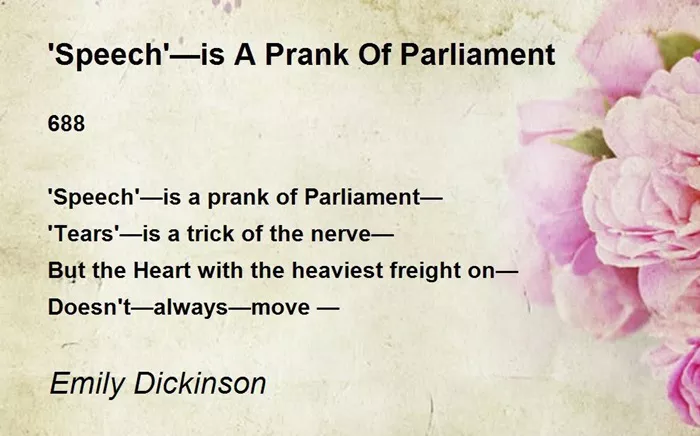Welcome to Poem of the Day – Speech—is a Prank of Parliament by Emily Dickinson.
Emily Dickinson is renowned for her ability to convey complex thoughts in simple yet profound ways. In her poem “Speech—is a Prank of Parliament,” Dickinson examines the notion of speech and its role in society, particularly in the context of power and politics. The poem offers a critical view of speech as a tool used for manipulation and control, making it an essential subject for analysis.
Speech—is a Prank of Parliament Poem
Speech—is a prank of Parliament—
“Speech”—is a prank of Parliament—
“Tears”—is a trick of the nerve—
But the Heart with the heaviest freight on—
Doesn’t—always—move—
Speech—is a Prank of Parliament Explanation
The title itself, “Speech—is a Prank of Parliament,” hints at Dickinson’s skepticism about the role of speech in government and politics. The word “prank” suggests that speech, particularly in the context of political discourse, is often used deceptively, to mislead or manipulate rather than to communicate truthfully. This is not a playful “prank” in the innocent sense, but rather a more sinister use of language for power and control.
The Role of Speech in Politics
In her poem, Dickinson suggests that speech, especially when delivered by those in power, is not a vehicle for truth but a performance designed to distract, entertain, or deceive the audience. The reference to “Parliament” alludes to political bodies or institutions where speech is often crafted to serve particular agendas, rather than the collective good.
Dickinson’s choice of the word “prank” is especially significant because it implies that those in positions of power manipulate language for their benefit. Speech, in this context, is not an expression of authentic thought or conviction but a tactic employed to sway public opinion and maintain control.
The Deceptive Nature of Language
One of the central themes of the poem is the deceptive nature of language. Dickinson suggests that speech can obscure the truth. While it may sound eloquent and convincing, the words may ultimately serve a different, more self-serving purpose. This aligns with her broader view of the world as full of falsehoods, masks, and veils that conceal the truth.
By calling speech a “prank,” Dickinson points to the idea that what is being said may not necessarily align with reality. In the political realm, speeches often promise much but deliver little. They create an illusion of progress or action, but in reality, they may be nothing more than empty promises or distractions.
The Paradox of Political Speech
In “Speech—is a Prank of Parliament,” Dickinson also explores the paradox inherent in political speech. While speech is the primary means by which politicians communicate with the public, it often fails to convey genuine intention or action. Instead, it becomes an instrument for manipulation, a means of maintaining control while offering little substance.
This paradox is not limited to Dickinson’s time but remains relevant in contemporary society. Politicians and leaders continue to use speech as a tool for persuasion, often speaking in a way that makes them appear more competent or trustworthy than they truly are. Dickinson’s poem is a sharp critique of this practice, urging readers to look beyond the surface of political speech and consider the motives behind the words.
Conclusion
Emily Dickinson’s “Speech—is a Prank of Parliament” provides a powerful reflection on the nature of language in the political sphere. By using the metaphor of speech as a “prank,” she critiques the deceptive and manipulative ways in which language is often employed for power and control. The poem encourages readers to question the authenticity of political rhetoric and to be wary of the illusions it may create.
In her characteristic style, Dickinson offers profound insights into the complexities of communication, urging us to see beyond the surface of words and consider the deeper intentions behind them. Through this poem, Dickinson invites us to reflect on the way language can shape our perceptions of reality, especially in the world of politics.

